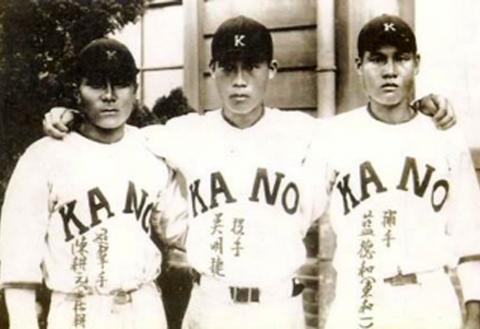While the popular Kano baseball movie opened in Taiwan a year ago, it finally made landfall in Japan, where movie distributors needed time to devise a special marketing strategy and add subtitles to the film, even though more than half the dialogue is in Japanese.
Taiwanese director Huang Ming-chuan (黃明川) says that delayed release is common practice in both Taiwan and Japan.
“Producers and investors hold back on the release of a newly-made film until they feel the time is right to hit the market,” Huang said, adding “a year delay in releasing Kano is a long time, but Japan works in mysterious ways sometimes.”

Photo: Zhou Min-hong, Taipei Times
Kano seems to have struck a chord, as filmgoers flocked to opening week screenings, according to news reports from Tokyo and Osaka. It didn’t hurt that four top Japanese actors were also in the cast.
“We watched Kano today, and we liked it a lot,” Mitsuko Ebihara, who saw the movie at a small cinema in Tokyo, told the Taipei Times in a recent e-mail.
“It was sold out, every seat was taken,” she said.
Ebihara said that all major TV networks and newspapers in Japan have reported on the Kano backstory. Few Japanese know about the history behind the movie, she added.
“But it seems that once they learned the facts from Japanese media, many people became interested in the film,” she said.
“Many Japanese love baseball, so I think the movie will attract a large Japanese audience nationwide.”
Kiyoko Kaneko, who lives in Sapporo, said she saw Kano last week and loved it.
“I didn’t know that Chiayi’s opposing team during the first game at Koshien was a team of Sapporo boys,” she said.
“The movie was exciting for this reason and touched me as a Japanese. The ending song was nice, and I was singing it in my heart because I knew the melody already from the TV ads for the movie.”

In the March 9 edition of the Taipei Times a piece by Ninon Godefroy ran with the headine “The quiet, gentle rhythm of Taiwan.” It started with the line “Taiwan is a small, humble place. There is no Eiffel Tower, no pyramids — no singular attraction that draws the world’s attention.” I laughed out loud at that. This was out of no disrespect for the author or the piece, which made some interesting analogies and good points about how both Din Tai Fung’s and Taiwan Semiconductor Manufacturing Co’s (TSMC, 台積電) meticulous attention to detail and quality are not quite up to

April 28 to May 4 During the Japanese colonial era, a city’s “first” high school typically served Japanese students, while Taiwanese attended the “second” high school. Only in Taichung was this reversed. That’s because when Taichung First High School opened its doors on May 1, 1915 to serve Taiwanese students who were previously barred from secondary education, it was the only high school in town. Former principal Hideo Azukisawa threatened to quit when the government in 1922 attempted to transfer the “first” designation to a new local high school for Japanese students, leading to this unusual situation. Prior to the Taichung First

Chinese Nationalist Party (KMT) Chairman Eric Chu (朱立倫) hatched a bold plan to charge forward and seize the initiative when he held a protest in front of the Taipei City Prosecutors’ Office. Though risky, because illegal, its success would help tackle at least six problems facing both himself and the KMT. What he did not see coming was Taipei Mayor Chiang Wan-an (將萬安) tripping him up out of the gate. In spite of Chu being the most consequential and successful KMT chairman since the early 2010s — arguably saving the party from financial ruin and restoring its electoral viability —

The Ministry of Education last month proposed a nationwide ban on mobile devices in schools, aiming to curb concerns over student phone addiction. Under the revised regulation, which will take effect in August, teachers and schools will be required to collect mobile devices — including phones, laptops and wearables devices — for safekeeping during school hours, unless they are being used for educational purposes. For Chang Fong-ching (張鳳琴), the ban will have a positive impact. “It’s a good move,” says the professor in the department of